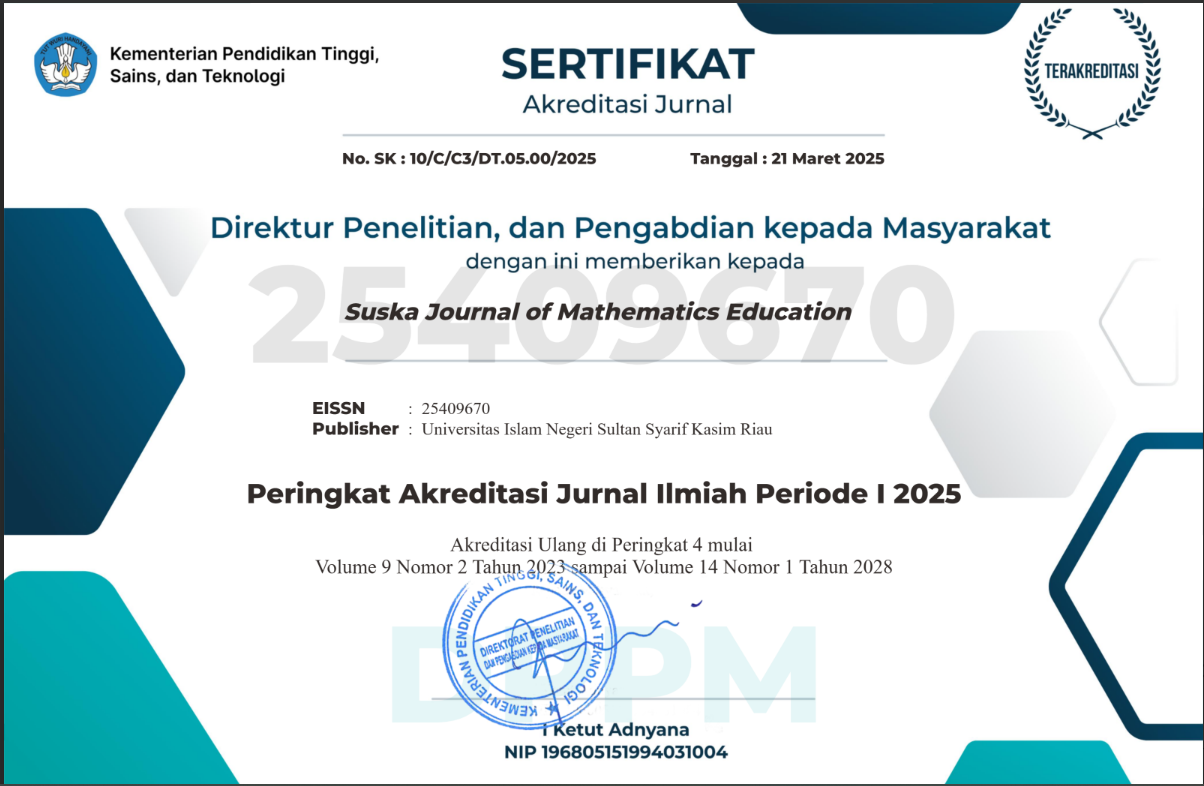THE EFFECT OF MAKE A MATCH (MAM) TYPE MODEL AND BAMBOO DANCE TYPE MODEL THROUGH COOPERATIVE LEARNING ON STUDENTS MOTIVATION
Abstract
Students motivation plays an important role in every learning process. Lacking in Make A Match (MAM) type model in mathematics teaching has become the justification in finding the solution for the crowded situation. This research used quasi experimental research design. The samples used were 60 students and they were requested to respond a set of motivation questionnaire. In addition, the students activity data was obtained from the observation sheet. T-test was used to determine the difference in motivation between experimental and control group. The result revealed that, the influence of the Make A Match (MAM) Type Model And Bamboo Dance Type Model Through Cooperative Learning on the motivation of the students.
Keywords
Full Text:
PDFReferences
Akpan, B.B. (2010). Innovations in Science and Technology Education through Science Teacher Associations Science Education International. Vol.21 (.2), 67-79.
Budiyono. (2009). Statistika untuk Penelitian. Surakarta: UNS Press.
Curran, L. (1994). Lenguage Arts and Cooperative Learning: Lessons for TheLittle Ones. San Juan Capistrano: Kagan Cooperative Learning.
Desiana, C. (2012). Penerapan Model Pembelajaran Kooperatif Tipe Make A Match Dalam Meningkatkan Keaktifan dan Kemampuan Pemahaman Siswa Pada Pokok Bahasan Operasi Hitung Bentuk Aljabar Kelas VII Tahun 2012/2013. Skripsi. Tidak dipubikasikan. Kediri: UNP KEDIRI.
Elliot, a J., Faler, J., McGregor, H. a, Campbell, W., Sedikides, C., & Harackiewicz, J. M. (2000). Competence valuation as a strategic intrinsic motivation process. Personality and Social Psychology Bulletin, 26(7), 780–794. https://doi.org/10.1177/0146167200269004
Hsiung, C.M. 2012. The Effectiveness of Cooperative Learning. Journal of Engineering Education.Vol. 101.1. pp: 119-137.
Huda, M. (2011). Cooperative Learning. Yogyakarta: Pustaka Belajar.
Isjoni. (2010). Cooperative learning. Bandung : Alfabeta.
Klinger, T. (2006). Learning Approach, Thinking Style and Critical Inquiry: The Online Community. The Korean Journal Of Thinking & Problem Solving, 16(1), p. 91-113.
Elliot, a J., Faler, J., McGregor, H. a, Campbell, W., Sedikides, C., & Harackiewicz, J. M. (2000). Competence valuation as a strategic intrinsic motivation process. Personality and Social Psychology Bulletin, 26(7), 780–794. https://doi.org/10.1177/0146167200269004
Moore, L. L., & Rotter, C. (2010). Using Achievement Motivation Theory to Explain Student Participation in a Residential Leadership Learning Community. Journal of Leadership Education, 9(2), 22–34. https://doi.org/10.12806/V9/I2/RF2
Pimta, S., Tayruakham, S., & Nuangchalerm, P. (2009). Factors Influencing Mathematic Problem-Solving Ability of Sixth Grade Students Chumchonbanchomsa-Ard School, Moeiwadi District, Roi-et Province 45250 Thailand Department of Research and Development Education , Faculty of Education, Department of Curric. Vol 5(4), 381–385.
Prasetyana, E. (2011). Upaya Meningkatkan Prestasi Belajar Matematika Melalui Penerapan Pembelajaran Number Head Together dan Make A Match Pokok Bahasan Operasi Suku Aljabar Kelas VIII M.Ts NU Mojosari Kecamatan Loceret Kabupaten Nganjuk Semester Ganjil Tahun Pelajaran 2011/2012. Skripsi. Tidak dipubikasikan. Kediri: UNP KEDIRI.
Rilawati, Y. D.. (2012). Penerapan Model Pembelajaran Kooperatif Tipe Make A Match Dalam Meningkatkan Motivasi dan Hasil Belajar Matematika Pada Pokok Bahasan Operasi Hitung Bilangan Pecahan Semester 1 Kelas VII SMP Negeri 6 Kota Kediri Tahun Ajaran 2012/2013. Skripsi. Tidak dipubikasikan. Kediri: UNP KEDIRI.
Sardiman, A. (2001). Interaksi dan Motivasi Belajar Mengajar. Jakarta: PT Rajagrafindo Persada.
Tran, V. D., & Lewis, R. (2012). Effects of Cooperative Learning on Students at An Giang University in Vietnam. International Education Studies, 5(1), 86-99. http://dx.doi.org/10.5539/ies.v5n1p86
Vansteenkiste, M., Sierens, E., Soenens, B., Luyckx, K., & Lens, W. (2009). Motivational Profiles from a Self Determination Perspective: The Quality of Motivation Matters. Journal of Educational Psychology, 101, p. 671-688
Williams, K. C., & Williams, C. C. (2011). Five key ingredients for improving student motivation. Research in Higher Education Journal, 12, 1–23. https://doi.org/10.5430/ijhe.v4n1p22
Zakaria, E., Chin, L. C., & Daud, Y. (2010). The Effects of Cooperative Learning on Students’ Mathematics Achievement and Attitude toward Mathematics. Journal of Social Sciences, 6(2), 272-275.http://dx.doi.org/10.3844/jssp.2010.272.275.
DOI: http://dx.doi.org/10.24014/sjme.v3i1.3511
Refbacks

This work is licensed under a Creative Commons Attribution-NonCommercial-ShareAlike 4.0 International License.
Published by:

FLAG COUNTER






